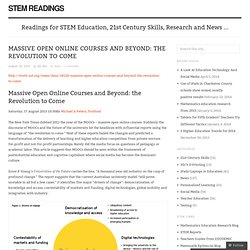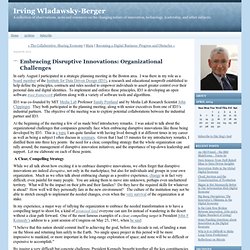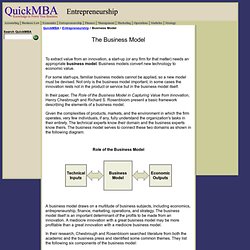

Massive Open Online Courses and Beyond: the Revolution to Come. Saturday, 17 August 2013 10:30By Michael A Peters, Truthout.

Embracing Disruptive Innovations: Organizational Challenges. In early August I participated in a strategic planning meeting in the Boston area.

I was there in my role as a board member of the Institute for Data Driven Design (ID3), a research and educational nonprofit established to help define the principles, contracts and rules needed to empower individuals to assert greater control over their personal data and digital identities. To implement and enforce these principles, ID3 is developing an open software trust framework platform along with a variety of software tools and algorithms.
ID3 was co-founded by MIT Media Lab Professor Sandy Pentland and by Media Lab Research Scientist John Clippinger. Technology in Education - Innovate My School. Business Model Innovation for Higher Education. Can universities keep delivering education in the same way that they have been for past few hundred years?

The reason this topic is coming up frequently these days is that digital technologies are having an increasing impact on the delivery of education. Consequently, Don Tapscott wonders if the university model of delivering education can still work, while Seth Godin thinks that the increasing availability of information could make universities irrelevant. David Parry believes that the way forward is to ensure that universities protect their social value, not their current revenue models.
I’ve been asked to give a short talk on this topic for the upcoming Annual Meeting for the American Association of State Colleges and Universities. Business Model. The Business Model To extract value from an innovation, a start-up (or any firm for that matter) needs an appropriate business model.

Business models convert new technology to economic value. For some start-ups, familiar business models cannot be applied, so a new model must be devised. Innovation and the Value Network. Today I will tell you why it is so hard for you to get your innovative new idea to spread quickly.

Well, one of the reasons, at least. It’s because the economy is so interconnected. This is a bit counterintuitive – after all, I was just telling you how we can use networks to spread ideas. The good side of networks is that they can make it easier for ideas to spread. The problem with networks is that to get people to actually adopt your new idea, you often have to get them to break links within their existing network, and this can be very difficult. Value networks show up in most of the various business model frameworks. As an illustration, here is a model of the value network for mobile phones, adapted from the book Invisible Engines by Evans, Hagiu & Schmalensee.
Apple has chosen to control everything within the circle – in other words, everything! Eight UK schools to take part in 'Internet of Things' pilot. Internet Librarian International 2012. To view full information on keynotes and programme Keynotes Professor and Dean's Scholar for New Librarianship, Syracuse University School of Information Studies & Director of the Information Institute of Syracuse USA and author of The Atlas of New Librarianship which won the 2012 ABC-CLIO/Greenwood Award for the Best book in Library Literature Roly Keating is the new Chief Executive of The British Library.

Prior to this, he was the BBC's first ever Director of Archive Content and a former Controller of BBC Two. Under the theme, Re-imagine, Renew, Reboot: Innovating for Success, Internet Librarian International's programme of practical workshops, conference sessions, keynotes, case studies, panels and networking activities shares the latest trends in technology and innovation, and brings you face-to-face with some of the most distinguished practitioners and providers in today's global information space. Our Sponsors New Venue What our delegates said about Internet Librarian International 2011. Teaching the History of Innovation: A History Institute for Teachers. Welcoming Remarks Walter A.

McDougall, Co-Chair of FPRI’s History Institute and professor of history and international relations at the University of Pennsylvania, noted that while Americans take for granted a frantic pace of change in our material culture, few humanities or social science teachers know much about the process or even the definition of innovation, and few stimulate students to question our faith in “progress.” The Coming Revolution in Public Education - John Tierney. Why the current wave of reforms, with its heavy emphasis on standardized tests, may actually be harming students Defendants in Atlanta's school cheating scandal turn themselves in.

(David Goldman/AP) It's always hard to tell for sure exactly when a revolution starts. Is it when a few discontented people gather in a room to discuss how the ruling regime might be opposed? Is it when first shots are fired? Critics of the contemporary reform regime argue that these initiatives, though seemingly sensible in their original framing, are motivated by interests other than educational improvement and are causing genuine harm to American students and public schools. Fueled in part by growing evidence of the reforms' ill effects and of the reformers' self-interested motives, the counter-movement is rapidly expanding. It's what history teaches us to expect.
There are more reasons why there is a growing rebellion against the reigning reform agenda. Rather, we have a poverty problem. Innovating_Pedagogy_report_July_2012.